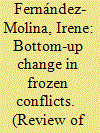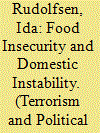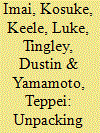|
|
|
Sort Order |
|
|
|
Items / Page
|
|
|
|
|
|
|
| Srl | Item |
| 1 |
ID:
164985


|
|
|
|
|
| Summary/Abstract |
This article proposes a typology of causal mechanisms whereby transnational relations of recognition constitute conflict actors in frozen conflicts. While the agency of an emerging conflict actor manifests itself in ‘struggles for recognition’ motivated by experiences of ‘disrespect’, responses from different significant others vary in terms of motivations and pathways (mechanisms of recognition). Adapting Honneth’s tripartite division, the typology distinguishes between four forms of recognition: thin cognitive recognition, ‘respect’/rights, ‘esteem’/difference, and ‘love’/empathy. Three transnational corrections are made in order to include transnational relations of recognition, non-state actors, and unstructured social-relational forms of international/transnational recognition. The typology is applied to the conflict of Western Sahara, which has been reshaped by the rise of internal Sahrawi pro-independence groups (based inside the territory annexed by Morocco) as an increasingly relevant conflict actor, with their identity shifting from victims to human rights activists to activists involved in an unsolved conflict. This identity and social-status formation has been the product of transnational recognition from three significant others: the annexing state (Morocco), the contested state-in-exile (SADR), and the international community. The overall effect of intermingling recognition processes, including various instrumental initiatives deprived of mutuality, has been increased struggle and conflict complexity rather than ‘recognitional peace’.
|
|
|
|
|
|
|
|
|
|
|
|
|
|
|
|
| 2 |
ID:
175705


|
|
|
|
|
| Summary/Abstract |
Research on the relationship between food insecurity and unrest has a long history. The food price spikes in 2007–2008 and 2010–2011 coincided with demonstrations and incidents of large-scale violence, prompting renewed scholarly interest in the link between food insecurity and unrest. This paper reviews the literature, synthesises its main empirical findings and central explanations, and identifies four particular issues to consider to enhance our understanding of how food insecurity is related to unrest. First, there is a wide range of suggested theoretical mechanisms of how food insecurity is linked to unrest, but the empirical tests are akin. Second, there exist various notions of the independent variable, but there is a gap between the theoretical definition and measurement. Third, the focus is often on “food riots”, but whether rioting is the most likely response, and whether it is possible to separate between “food-related” unrest and other types of turmoil is unclear. Lastly, there is a challenge to address the endogenous nature of food insecurity and unrest. The paper adds to the literature by pointing to the theoretical mechanisms linking food insecurity to unrest, relating both to the type and degree of food insecurity, and how we understand and define unrest.
|
|
|
|
|
|
|
|
|
|
|
|
|
|
|
|
| 3 |
ID:
133749


|
|
|
|
|
| Publication |
2014.
|
| Summary/Abstract |
International and transnational diffusion have always been an important dimension of international studies but only recently has attention shifted from the nuts and bolts of whatever it is that diffuses (technology, policies, ideas, services, values, institutions, power, people, emotions, and much more) to a more self-conscious effort to conceptualize diffusion itself. As the theme of the 2013 ISA Convention in San Francisco, a large number of panels addressed diffusion explicitly in novel and interesting ways. This symposium presents a very small subset of an intellectually impressive and multifaceted program that featured the association's diversity.
|
|
|
|
|
|
|
|
|
|
|
|
|
|
|
|
| 4 |
ID:
105890


|
|
|
|
|
| Publication |
2011.
|
| Summary/Abstract |
Neodevelopmental patent regimes aim to facilitate local actors' access to knowledge and also encourage incremental innovations. The case of pharmaceutical patent examination in Brazil illustrates political contradictions between these objectives. Brazil's patent law includes the Ministry of Health in the examination of pharmaceutical patent applications. Though widely celebrated as a health-oriented policy, the Brazilian experience has become fraught with tensions and subject to decreasing levels of both stability and enforcement. I show how one pillar of the neodevelopmental regime, the array of initiatives to encourage incremental innovations, has fostered the acquisition of innovative capabilities in the Brazilian pharmaceutical sector, and how these new capabilities have altered actors' policy preferences and thus contributed to the erosion of the coalition in support of the other pillar of the neodevelopmental regime, the health-oriented approach to examining pharmaceutical patents. The analysis of capability-derived preference formation points to an endogenous process of coalitional change.
|
|
|
|
|
|
|
|
|
|
|
|
|
|
|
|
| 5 |
ID:
110557


|
|
|
|
|
| Publication |
2011.
|
| Summary/Abstract |
Identifying causal mechanisms is a fundamental goal of social science. Researchers seek to study not only whether one variable affects another but also how such a causal relationship arises. Yet commonly used statistical methods for identifying causal mechanisms rely upon untestable assumptions and are often inappropriate even under those assumptions. Randomizing treatment and intermediate variables is also insufficient. Despite these difficulties, the study of causal mechanisms is too important to abandon. We make three contributions to improve research on causal mechanisms. First, we present a minimum set of assumptions required under standard designs of experimental and observational studies and develop a general algorithm for estimating causal mediation effects. Second, we provide a method for assessing the sensitivity of conclusions to potential violations of a key assumption. Third, we offer alternative research designs for identifying causal mechanisms under weaker assumptions. The proposed approach is illustrated using media framing experiments and incumbency advantage studies.
|
|
|
|
|
|
|
|
|
|
|
|
|
|
|
|
|
|
|
|
|